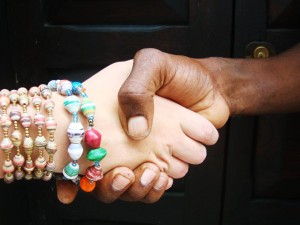 A major goal for More Africa is to develop the “community based tourism“, where encounters between locals and visitors from other parts of the world are encouraged. Read below what CBT is and how More Africa offers Community Baeed Tourism to her guests.
A major goal for More Africa is to develop the “community based tourism“, where encounters between locals and visitors from other parts of the world are encouraged. Read below what CBT is and how More Africa offers Community Baeed Tourism to her guests.
What is community based tourism? (Source https://www.responsibletravel.com/)
A community by definition implies individuals with some kind of collective responsibility, and the ability to make decisions by representative bodies.
Community based tourism is tourism in which local residents (often rural, poor and economically marginalised) invite tourists to visit their communities with the provision of overnight accommodation.
The residents earn income as land managers, entrepreneurs, service and produce providers, and employees. At least part of the tourist income is set aside for projects which provide benefits to the community as a whole.
Community based tourism enables the tourist to discover local habitats and wildlife, and celebrates and respects traditional cultures, rituals and wisdom. The community will be aware of the commercial and social value placed on their natural and cultural heritage through tourism, and this will foster community based conservation of these resources.
The tourist accommodation and facilities will be of sufficient standard for Western visitors, albeit those expecting simple rural accommodation. The community will be required to have continuous access to a phone (which might be required for medical assistance) and daily access to email (which will be required by operators to confirm bookings).
Can cultures & communities benefit from tourism?
Visiting tribal people and indigenous communities has never been more popular – or easier to do.
Many people find ancient ways of life fascinating, and often of great romantic appeal. In today’s world of concrete, supermarkets, fashions, celebrity culture, stressful jobs and lack of community spirit, the ideal of people living together close to nature in the same way that they have for centuries is extremely appealing. For many there is nothing like bridging centuries of modern development and making a connection with people whose lives are so very different to our own. And those of us privileged enough to have visited, and listened properly, will have discovered that traditional communities often have far more to teach us about our society and our lives than we can teach them about our world.
Although every community is different, many indigenous cultures are extremely vulnerable to outside influences. It has been argued that tribal people need to be ‘protected’ from tourism in order to preserve their unique cultures, and in many cases this may true. However we must remember that all people have a right to make their own decisions about their involvement in tourism, and which aspects of a globalised world they would like to benefit from.
In many cases healthcare and education are a priority, and tourism can provide one way of earning money to provide for this. Many indigenous groups have been marginalised and derided by other communities and governments as being ‘primitive’; for some of these, meeting people with a genuine interest and respect for them is important. However, the journey to meeting tourists, and inviting them into their villages or homes is a complex one, if it is going to be done in an ethical and responsible way.
The key to success
Whilst it is easy to say that we should leave indigenous communities to make their own decisions about how and when to invite tourists into their communities and lives, it’s vital that they are able to make informed decisions. Truly successful community tourism projects are the result of extensive cooperation between a community and a tourism expert, who knows exactly how to facilitate a form of tourism that is led by and empowers the people living in that community. Community based tourism, or CBT as it is sometimes known as, is a two-way street where tourism both provides local employment and income for education, development and conservation initiatives, while at the same time giving both hosts and guests a unique opportunity for cultural exchange.
It is often with the help of an outside facilitator, that the community becomes aware of the commercial and social value placed on their natural and cultural heritage, and is encouraged to become actively involved in the conservation of these resources. As well as learning the necessary skills to run it as a sustainable business, while understanding the pros and cons of tourism.
More Africa’s community based tourism:
- More Africa offers tours on the premises where we inform people about our work, but also the do’s and dont’s of tourism. We will try to make people aware of these do’s and dont’s.
- More Africa offers working vacations at More Africa Guesthouse where encounters between locals and visitors from other parts of the world are encouraged.
- More Africa Guesthouse offers an exquisite restaurant, which will generate income for More Africa NGO.
- More Africa Guesthouse offers bungalows for paying guest; while staying with us, guest donate straigth to the NGO

